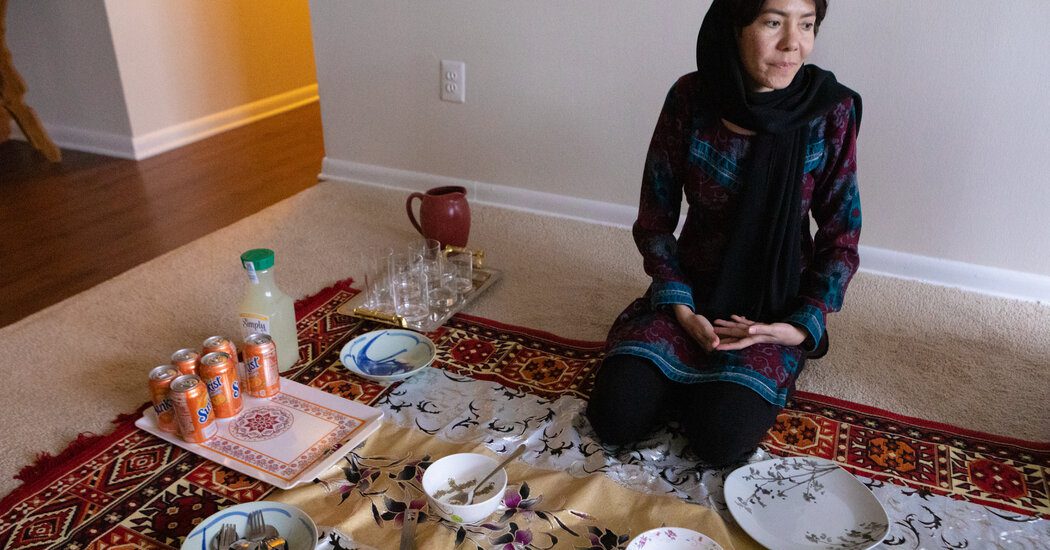Global Courant 2023-04-28 06:32:27
WASHINGTON – Before her country and her life suddenly and fundamentally changed in 2021, Mahnaz Akbari was the trailblazing commander of the Afghan National Army’s Female Tactical Platoon, an all-female squad that accompanied elite US Special Operations forces on daring missions. mountain missions, hunted ISIS fighters and freed prisoners from Taliban prisons.
Ms. Akbari, 37, and her soldiers did so at great personal risk. A woman was shot through the neck and suffered a skull fracture. Another was killed shortly before the fall of Kabul. And after the Taliban took over the country, many members of the platoon had to flee to the United States.
Now Ms. Akbari and other members of the Female Tactical Platoon embark on another mission: to convince Congress that their service in Afghanistan has earned them the right to remain in America permanently.
“Our missions targeted big targets: a Taliban commander or a Da’ish leader,” Ms. Akbari said, using another name for ISIS during a recent interview at her apartment in Silver Spring, MD.
On Thursday, Ms. Akbari and a group of other women from the Female Tactical Platoon met with lawmakers on Capitol Hill to try to revive stalled legislation to address the precarious immigration status of their and other Afghans. The soldiers are in the United States under a two-year humanitarian parole that expires in August. That would end the women’s work permits, forcing their new employers to quit their jobs and leaving them in legal limbo.
Thursday’s meetings ranged from liberal to conservative lawmakers.
Senator Ted Cruz, a Texas Republican who has supported strict immigration policies, made his meeting with the women sound impressed and sympathetic.
“Brave Afghans have risked their lives to keep American soldiers safe, and we have a responsibility to them,” Cruz said after the rally.
That sentiment was echoed by Rep. Michael Waltz, a Florida Republican who has just supported former President Donald J. Trump for re-election but has been a champion of helping Afghan refugees who aided U.S. troops during the decades-long war in Afghanistan.
‘You are all fellow soldiers; we all fought together,” Mr. Waltz, a former Green Beret, told the women at a rally hosted by Representative Seth Moulton, a Democrat from Massachusetts who served in the Marines. “What is ingrained in us and in every soldier is that you never leave a fellow soldier behind – ever. So we keep fighting for those left behind.”
Senator Amy Klobuchar, a Minnesota Democrat, said she spearheaded a review of the Afghan adjustment bill, which died in the last Congress due to lack of Republican support.
That bill, which would have created a legal path for permanent residency for Afghans who risked their lives during the conflict in Afghanistan to help Americans — as translators, drivers and fixers — stalled amid Republican vetting concerns . About 82,000 Afghans were evacuated to the United States after the fall of Kabul. Since then, most have been living in legal limbo, without long-term permission to stay.
The measure, which required additional security checks, was based on laws enacted after other humanitarian crises, such as the Vietnam War. Similar statutes were also issued after crises in Cuba, Nicaragua and Iraq.
It also would have opened a path to permanent clearance for four specific groups: the Afghanistan National Army Special Operations Command, the Afghan Air Force, Afghanistan’s Special Mission Wing, and Afghanistan’s women’s tactical teams.
Ms. Klobuchar is working on a rewrite of the bill in hopes of getting enough allies to pass the legislation. She said she spoke on the phone three times with former President George W. Bush about his support for the effort.
“In the Senate, we have growing Republican support,” Ms. Klobuchar said. “They can’t stay in the dark for that long. Those women are part of tens of thousands of Afghans who supported our country.”
However, should the effort fall short, some advocates said Congress could consider a narrower bill that would only help the dozens of women on the special forces team stay in the United States.
In a meeting with the women, Erin Chapman, Ms. Klobuchar’s senior adviser, said concessions were needed to gain Republican support for the bill. Republican senators requested “additional vetting” of the women, to be conducted by the Department of Defense.
Mary Kolars, an army captain who led the Cultural Support Team in Afghanistan and worked closely with the Afghan women, asked Ms. Chapman about the security concerns of the platoon’s relatives, most of whom had remained in Afghanistan.
“These women, their families are being targeted — their siblings, parents,” Ms. Kolars said.
As his meeting with the soldiers got underway on Thursday, Arizona Democrat Representative Greg Stanton tried a different tactic. Mr. Stanton had sent a letter to Alejandro Mayorkas, Secretary of Homeland Security, requesting that she personally arrange for members of the Female Tactical Platoon to have their asylum cases tried through the US Citizenship and Immigration Services as soon as possible.
Only three of the nearly 45 female soldiers have been granted asylum so far, Mr Stanton said, expressing concern that they were being treated differently because of their gender.
“I am concerned that this group of courageous women is receiving unequal treatment from your department,” Mr Stanton wrote to Mr Mayorkas. “Many male Afghan soldiers, including pilots, have been granted asylum within 180 days.”
The attempt to give the women a path to permanent residency is in some ways just plugging a loophole, their allies say. Contractors such as translators and fixers who worked directly for the US government are eligible for special immigrant visas, while soldiers who were paid directly by the Afghan government are not eligible.
The story of how the Female Tactical Platoon was established and then evacuated from the country goes back more than a decade.
About 10 years after the war in Afghanistan, the US military decided it needed female troops to help patrol rural villages in the country.
It was considered culturally insensitive for the male soldiers to talk to Afghan women in some parts of the country, so Ms. Akbari and her troops would lead the talks. They carried weapons in case they encountered enemy combatants, but also chocolate in case they encountered children.
Although they primarily served as cultural ambassadors, the work put them in grave danger. When a platoon member conducted a search, the woman she was looking for pulled out a gun and opened fire, badly wounding her. During some firefights between US forces and ISIS, the sky lit up with what appeared to be fireworks, Ms. Akbari recalls.
“These were really dangerous missions with valuable targets at stake,” Ms. Kolars said. “When we talk about why they deserve our help, it’s very personal to me, because Mahnaz might as well be my sister. They sacrificed themselves for their country and for ours. The bond between our two units is quite inseparable.”
Most of the women are Hazara, an ethnic minority that has been violently persecuted under Taliban rule. Living as a Hazara in Taliban-controlled Afghanistan doubles the risk of having female relatives who worked with US troops. Ms Kolars said many of the platoon’s members had relatives killed, tortured or threatened by the Talibs.
After the fall of Kabul, the Taliban confiscated the women’s paperwork so the group could trace their families, Ms. Kolars said, but the information remained in the Afghan government’s files because the women had been so thoroughly vetted.
A network of mostly female American soldiers gathered to help the Afghan women quickly evacuate the country.
Now members of the female platoon work at Chick-fil-A, as baristas and in supermarkets.
“In one night they went from being these powerful, incredible soldiers with direct aim to suddenly, in the eyes of the Taliban, you are barely human,” Ms. Kolars said.
They are scattered across the country, but many want to re-enter the battlefield.
Ms. Akbari said Thursday she was ready to do it all over again. If she gets her green card, she said, she will join the US military.








